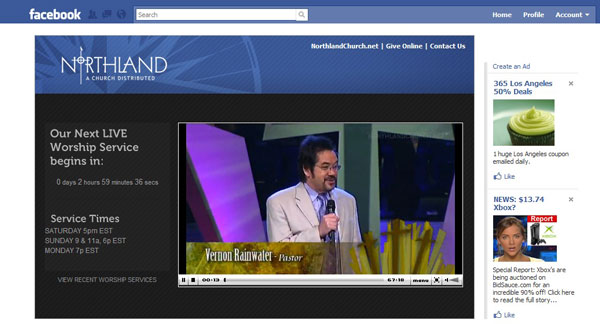With a generation of social media consuming people, perhaps it’s no surprise that the upcoming generation has formed churches in the “nation” of Facebook.
Earlier this month, Northland, A Church Distributed, officially opened the doors to its new Facebook app. The church consists of a congregation of 12,000 that worships at four sites in the Orlando, Fla. area and more than 1,000 sites worldwide via an interactive Webcast.
“We encourage people to be the church everywhere, every day, so it just makes sense to put resources out there that will help people to be that church,” explained Nathan Clark, Northland’s director of digital innovation on the online site for the church. “At Northland, we often talk about the need to take the church to the people, versus asking them to come to us…. Why require a virtual commute over to our Web site when you can have church where people are?”
The church started Webcasting live services in January 2006 and, 18 months later, launched an interactive Web stream of its services that includes immediate access to an online pastor and the ability to chat instantly with other worshipers. Approximately 2,000 people use this venue each weekend.
On July 4, 2009, the church launched an iPhone Web app offering not just videos of past services, but the ability to join live services as they are happening over 3G and Wi-Fi networks. Additionally, 200 of Northland’s congregants now serve as online missionaries, replying to emails from thousands of seekers around the world.
Some at Biola have their reservations about the concept of Facebook churches.
“Facebook churches can be helpful but cannot replace church any more than the Incarnation can be replaced by Jesus ‘friending’ everyone on Facebook,” said John Mark Reynolds, founder and director of the Torrey Honors Institute.
Reynolds wrote a book with Roger Overton called “The New Media Frontier: Blogging, Vlogging, and Podcasting For Christ,” which discusses how a new technology of communication is revolutionizing culture and that Christians are called to use this new media properly.
“Christendom needs preserved discourse within a living community. For the Christian, our motive must always be based in love,” Reynolds wrote in his book. “Love can be hinted at in books and art but can only be experienced between living beings.”
But some agreed that online church can further people’s walk with God.
“Streaming a sermon online isn’t the same as going to church, just as reading your Bible isn’t going to church,” said freshman Emily Woodroof. “But of course hearing the word in any way, shape or form is beneficial.”
“My mom started going online to watch a church that broadcast its sermons and so she would do worship and listen to the pastor,” said freshman Tiffany Chase. “After a while we ended up leaving our church and actually going to the church instead of just listening to it online.”
Some seemed to see some benefit of the online church for people who physically find it difficult to come.
“I think it’s a really good way if you want get people to church so they can be introduced to it then it will motivate them to go,” Chase said. “Also, what about people who travel or people who are disabled who can’t go to church? I think this type of church has its place in this world.”







